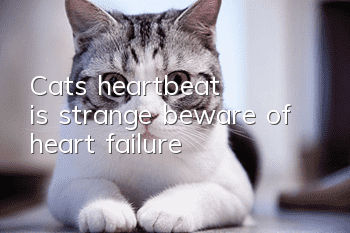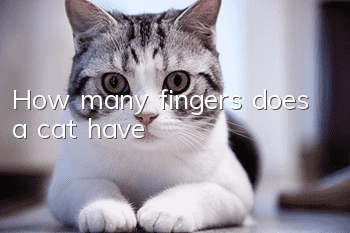Cat's heartbeat is strange, beware of heart failure!

A friend said that when he got up one morning, he found that his cat was lying on the ground and moving very slowly. He didn't think much about it at first. His cat was a big slacker. But then he heard a gasping sound and the cat seemed to be in pain. He stepped forward and picked it up, and found that there were no wounds and that it had not been out recently. Feeling something was wrong, he immediately sent the cat to the hospital. After a series of tests, the doctor told him the cat was suffering from congestive heart failure.
What is congestive heart failure?
Congestive heart failure is a life-threatening condition that requires immediate medical attention. Early detection may significantly increase chances of survival. If a cat exhibits possible symptoms, a veterinary consultation should be obtained immediately. Congestive heart failure (CHF) is a condition that occurs when insufficient blood circulates throughout the body, causing fluid to back up into the lungs. Failure can occur on the right or left side of the heart, or on both sides. It is often caused by thickening of the heart walls, also known as hypertrophic cardiomyopathy.
1. Early days
In cases where a heart problem has occurred but the cat or dog itself is not showing any symptoms, medications like beta blockers are sometimes given, but the pet is usually carefully watched for signs of progression.
2. Mid-term
There are telltale signs that your cat has congestive heart failure.
· Enlarge heart chambers
· Weak heart
· Heart murmur
3. Late stage
Moderate congestive heart failure has developed.
· Cough and difficulty breathing
· Liver or spleen enlargement, abdominal distension
· Coma/drowsiness, vomiting
· Lameness or even paralysis of the hind legs
· Coolness in limbs
· Loss of appetite
·Abnormal heart sounds
· Shortness of breath and panting
· High blood pressure (pupil no longer gets smaller)
· Blue discoloration of foot pads, tongue, or gums
Pets suffering from this disease may appear to be round in body at first glance, but if their backs are bony, you should suspect that they are suffering from severe heart failure. The rounded body may be due to an enlarged liver and fluid accumulation in the abdomen.
Note: Infectious diseaseInflammation, hepatic ascites or parasites may also occur.
Basis for diagnosis:
· Examine (auscultate) the heart and lungs with a stethoscope. It is especially important to identify abnormal heart sounds such as heart murmurs or irregular heartbeats (arrhythmias).
· X-rays to identify heart enlargement. Fluid builds up in the lungs and rules out some conditions like heart failure.
· Echocardiography is often the choice of choice to determine the final diagnosis of the cause of congestive heart failure.
· Blood tests to evaluate other organs (such as the kidneys) or to detect heartworm infection.
NOTE: This condition can be life-threatening when fluid accumulates in or around the lungs (pulmonary edema).
In addition, the doctor will also understand the pet's medical history and breed (genetic history) to make a comprehensive judgment. If necessary, he may also perform thyroid examination, blood culture, thoracentesis (abdominal cavity), etc. to help make a more accurate diagnosis.
Causes of heart failure:
· Anemia (can lead to heart muscle disease)
·Arrhythmias or irregular electrical impulses in the heart
· Birth defects
·Myocardial disease
· Diseases around the heart
·Heartworm
· Hyperthyroidism (uncontrolled can lead to heart muscle disease)
· Disadvantages of heart valves
Treatment:
The principles of treatment for congestive heart failure include improving heart function, preventing fluid accumulation, preventing further deterioration of the heart muscle, and antagonizing the chemicals and hormones that heart failure overproduces. It is rarely possible to treat heart disease. The most important cause of heart failure is cardiomyopathy. Definitive treatment usually requires a heart transplant (which has not been successful yet). Heart failure caused by a buildup of fluid in the sac around the heart (pericardial effusion) is not treated with medication but requires draining the fluid or removing part of the pericardium.
Commonly used drugs for heart failure
· Digitalis drugs
For pets whose condition is not serious, digitalis powder can be taken orally. 0.03~0.04mg/kg body weight, 1/3 of the first feeding, gradually reduce by 1 every 8 hours/2 amount, when the heart condition improves, the heart rate slows down, urination, etc., use 1/10 amount as the maintenance amount.
For pets with serious illness, digisoxin (dài) injection should be injected intravenously. The first dose is 0.2~0.4mg, and then 0.2mg should be injected every 8 hours. After the effect is shown, a maintenance dose (total amount of 1/10).
Or Trichoside K0.25~0.5mg, dilute 10~20 times with 5% glucose solution, and inject slowly intravenously. If necessary, repeat once with a small dose after 2 to 4 hours.
Note: If maintenance therapy is possible, quinidine sulfate tablets can be fed, 11 to 22 mg/kg body weight, once every 6 hours.
· Diuretics
For example, the drug furosemide (furosemide), 0.6 to 0.8 mg/kg body weight, intramuscular injection or intravenous injection, once a day. Or hydrochlorothiazide (hydrochlorothiazide), 0.05-0.1g, intramuscular injection, 1-2 times a day, use it for 3-4 days, stop taking it for 1-2 days and then use it again.
· Sedatives
It can reduce the burden on the heart, keep it quiet, and avoid excessive exercise; feed easily digestible food in small amounts and multiple times, and appropriately limit salt intake.
· Vasodilators
Corticosteroids such as hydrocortisone reduce cardiac afterload.
·Symptomatic treatment
Correct acid-base balance imbalance and electrolyte imbalance, and pay attention to correcting hypokalemia. Provide oxygen therapy if necessary. Adjuvant treatment is provided with energy mixtures such as adenosine triphosphate, coenzyme A, cytochrome C, vitamin B6 and glucose.
Note: Specific treatment methods and special medications should be judged by a doctor after considering various situations. During this period, medication must not be stopped without authorization.
Post-treatment care:
There is currently no cure for heart disease, but post-care can be used to help pets prolong their lives and reduce their pain.
· Check regularly and carefully observe your pet’s cough, sleep, activity level, diet, etc., so that the doctor can make a comprehensive judgment;
· Bring your medication and let the doctor know about your medication;
· Measure arterial blood pressure;
· Blood tests are often recommended to check kidney function and blood electrolytes;
· If this drug is prescribed, regular blood digoxin testing should be performed;
· Add light exercise to your pet, such as a short walk;
· Ensure adequate water supply.
Tips:
Maine Coons, Ragdolls, British Shorthairs, American Shorthairs, Persians (Persian cats, Exotic/Garfield cats), as well as Doberman Pinschers, Dachshunds, Great Danes, French Bulldogs, etc. all have potential heart genetic diseases. Parents are advised to Take him to the hospital for check-ups regularly (once every 6 months or once a year) to observe heart changes and provide timely treatment~
Recommended Good Things
Aineng Pet Odor Eliminating Disinfectant can effectively remove body odor/feces odor and other odor molecules! Effective in treating skin diseases caused by fungi/bacteria! Can kill parvovirus/canine distemper virus/coronavirusetc!
It is edible grade for pets, does not contain fragrances, does not contain chemicals, can be sprayed directly, and is harmless to human pets!
Consultation: 13028809308 (WeChat synchronization)
Scan the QR code on WeChat to enter the purchase
- What should I do if my cat doesn’t like to drink water? There are tricks to make cats drink water!
- What are the common types of cat litter?
- What are the blood types of cats?
- Symptoms and causes of food allergies in pet cats
- Can cats shed hair if they eat egg yolks? What are the benefits of cats eating egg yolks?
- What happened if the one-month-old kitten vomited?
- Causes, symptoms and preventive measures of cat miscarriage
- When does a cat molar its teeth?
- What should you pay attention to when raising Jinjila kittens? How to feed Jinjila kittens!
- The list of the most expensive pet cats in the world is out, and the first one is too expensive to keep!



